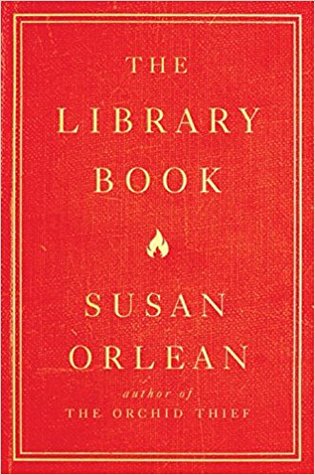The Library Book Susan Orlean (2018)
Susan Orlean has been a staff writer for the New Yorker for decades, so she knows how to write a punchy piece about a disaster like the catastrophic 1986 fire at the Los Angeles Public Library. But this time, instead of boiling her investigations down to 5000 words, she has expanded them into a book-length exploration of the Los Angeles Public Library and of libraries in general. With each chapter of The Library Book she traipses off in a different direction—the biographies of early librarians in LA, her own love of books, and even the burning of books as a tool of oppression in Nazi Germany.
Threading through it all is Orlean’s search for answers to why the LA Public Library burned in 1986, with the incineration of 400,000 books and serious damage to 700,000 more. Orlean keeps coming back to arson suspect Harry Peak, and she interviews Peak’s family, friends, and associates as she tries to figure out what really happened. Orlean’s weaving of the story is mesmerizing. You come away knowing a lot more about the creation of books and libraries, without even realizing that you’ve been taught.
Her insights into the value of public libraries, backed by many examples, are priceless. Here are a few:
“The publicness of the public library is an increasingly rare commodity. It becomes harder all the time to think of places that welcome everyone and don’t charge any money for that warm embrace.” (67)
“In times of trouble libraries are sanctuaries. They become town squares and community centers—even blood-draw locations.” (76)
“Books are a sort of cultural DNA, the code for who, as a society, we are, and what we know. All the wonders and failures, all the champions and villains, all the legends and ideas and revelations of a culture last forever in its books. Destroying those books is a way of saying that the culture itself no longer exists; its history has disappeared; the continuity between its past and its future is ruptured. Taking books away from a culture is to take away its shared memory. It’s like taking away the ability to remember your dreams. Destroying a culture’s books is sentencing it to something worse than death: It is sentencing it to seem as if it never lived.” (103)
My home-town source for reading material, the Ann Arbor District Library (AADL), is a gem of a system. Since I can’t afford to buy books, all the reviews on this Cedar Park Book Blog are based on my borrowings from AADL, which has an aggressive acquisitions program as well as exceptional staff at all levels. The visionary Library Director, Josie Parker, has shepherded the AADL into the digital age while retaining all the qualities of a traditional library. I applaud the Ann Arbor District Library as I recommend Susan Orlean’s book, which is an encomium for all libraries.
For you writers out there, I offer one more quotation:
“You don’t need to take a book off a shelf to know there is a voice inside that is waiting to speak to you, and behind that was someone who truly believed that if he or she spoke, someone would listen. It was that affirmation that always amazed me. Even the oddest, most particular book was written with that kind of crazy courage—the writer’s belief that someone would find his or her book important to read. I was struck by how precious and foolish and brave that belief is, and how necessary, and how full of hope it is to collect these books and manuscripts and preserve them. It declares that all these stories matter, and so does every effort to create something that connects us to one another, and to our past and to what is still to come.” (309-310)


